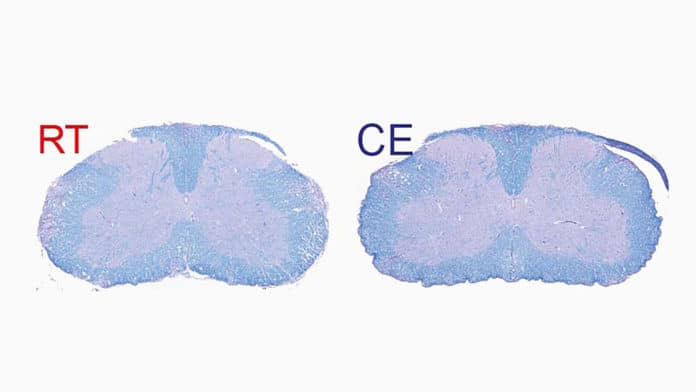In autoimmune diseases, the body’s immune system attacks the body’s organs. Multiple sclerosis is the most common autoimmune disease of the central nervous system.
Within MS, the immune system attacks the myelinn, the protective sheath that covers nerve fibers. The disease causes communication problems between your brain and the rest of your body.
The life History Theory suggests that when the environment is favorable, the resources used by any organism are devoted to growth and reproduction. In hostile environments, resources are shifted away from growth and reproduction programs into maintenance programs. Along with immunity, these maintenance traits include adaptations to energy scarcity and changes in the environmental temperature.
Scientists at the University of Geneva (UNIGE) developed this idea to a specific field of medicine: the erroneous activation of the immune system that causes autoimmune diseases.
They studied mice suffering from a model of multiple sclerosis. They wanted to understand how exposure to cold pushed the organism to divert its resources from the immune system towards maintaining body heat.
Scientists placed the mice in a relatively colder living environment — about 10°C — following acclimatization of gradually decreasing the environmental temperature. They found that cold exposure decreases MHCII on monocytes. It also suppresses T cell priming and pathogenicity through the modulation of monocytes.
Doron Merkler, professor at the Department of Pathology and Immunology and the Centre for Inflammation Research at the UNIGE Faculty of Medicine and co-corresponding author of the work, said, “After a few days, we observed a clear improvement in the clinical severity of the disease as well as in the extent of demyelination observed in the central nervous system. The animals did not have any difficulty in maintaining their body temperature at a normal level, but, singularly, the symptoms of locomotor impairments dramatically decreased, from not being able to walk on their hind paws to only a slight paralysis of the tail.”
Exposure to cold modulates the activity of inflammatory monocytes by decreasing their antigen-presenting capacity. This rendered T cells, a cell type with a critical role in autoimmunity, less activated.”
Mirko Trajkovski said, “By forcing the body to increase its metabolism to maintain body heat, the cold takes resources away from the immune system. This leads to a decrease in harmful immune cells and therefore improves the symptoms of the disease.”
“While the concept of prioritizing the thermogenic over the immune response is protective against autoimmunity, it is worth noting that cold exposure increases susceptibility to certain infections. Thus, our work could be relevant not only for neuroinflammation but also other immune-mediated or infectious diseases, which warrants further investigation.”
Journal Reference:
- Martina Spiljar, Karin Steinbach et al. Cold exposure protects from neuroinflammation through immunologic reprogramming. DOI: 10.1026/j.cmet.2021.10.002
